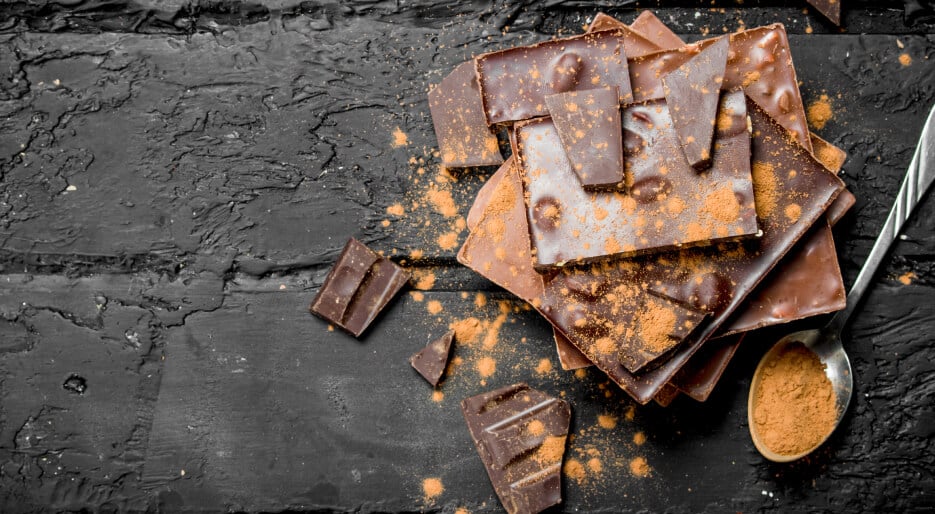For Muslim consumers, ensuring that the food they eat, including chocolate, is halal is an important part of faith. However, with so many chocolate brands and varieties available, it can be challenging to determine what chocolates are truly halal.
This guide will help you identify halal chocolates, understand common non-halal ingredients, and learn how to verify a product’s halal status.
Quick Take
Most plain chocolate can be halal, but hidden ingredients, alcohol-based flavor carriers, animal-derived emulsifiers, and cross-contamination risks mean you cannot trust every bar. A little label-reading, and a polite email to the manufacturer, goes a long way toward sweeter peace of mind.
Why Chocolate Isn’t Automatically Halal
| Potential Issue | Where It Shows Up | What to Do |
| Alcohol (ethanol) | Liquor-filled centers, vanilla extracts, carrier solvents | Avoid “liqueur,” “spirit,” or “extract (alcohol)” on the label. |
| Gelatin & Marshmallow Bits | Rocky-road bars, nougat layers, chewy centers | Look for halal gelatin or skip products listing gelatin altogether. |
| Animal-Based Emulsifiers (E 471, E 472, mono- & diglycerides) | Glossy coatings, low-fat chocolate, spreads | Confirm plant-origin with the brand or look for a halal logo. |
| Whey & Milk Powders | Milk chocolate, white chocolate | Require milk from halal-slaughtered cows—most brands skip this detail. |
| Cochineal / Carmine (E 120) | Red-tinted candy shells, ruby chocolate | Natural red dye from insects: haram. Choose plant-based colorings. |
| Cross-Contact With Non-Halal Lines | Shared factories handling pork gelatin candies or wine gums | Only a halal audit can verify cleaning protocols; ask for certification. |
How to Identify Halal Chocolate
Chocolates are not automatically halal as many (manufactured in non-muslim majority countries) contain alcohol, gelatin, or non-halal emulsifiers, while others may be processed on shared equipment with non-halal products. Here’s how you can verify halal status:
1. Look for Official Halal Certification
The most reliable way to confirm a chocolate is halal is by checking for a recognized halal certification from the manufacturer. Some well-known halal certifiers include:
- American Halal Foundation (USA)
- Canadian Halal Bureau (Canada)
- JAKIM (Malaysia)
- BPJPH (Indonesia)
2. Check the Ingredients List
Even if a chocolate isn’t halal-certified, it may still be halal if it avoids these common non-halal ingredients:
- Alcohol (found in some flavored chocolates or liquors)
- Gelatin (often derived from pork)
- Animal fats (unless from halal-slaughtered animals)
- Emulsifiers (E471, E442) – Some may be plant-based, but others could be animal-derived.
3. Beware of Cross-Contamination
Some chocolates are made in facilities that also process alcohol-based or pork-derived products, which could lead to cross-contamination. If unsure, contact the manufacturer for clarification.
How to Request Halal Certification from Companies
- Email or Call Customer Service – Politely ask if their products are halal-certified or if they plan to obtain certification.
- Request Through Social Media – Public questions on Twitter, Instagram, or Facebook can prompt faster responses.
- Encourage Others to Ask – The more requests a company receives, the more likely they are to consider halal certification.
Email / DM Template to Request Halal Confirmation
Subject: Halal Status of Your [Chocolate Name] in [Country]
Dear [Brand Team],
I’m a loyal customer who only buys halal-certified products. Could you please confirm whether [Product] sold in [Market] is 100 % halal (no ethanol, animal-based emulsifiers, or cross-contamination) and, if so, which certification body audited the plant?
Thank you for helping the Muslim community make informed choices.
Kind regards,
[Your Name]
It is also a good idea to send the same request on the brand’s social media channel. Public questions get quicker answers.
Final Advice
- Always check labels for certification and ingredients
- When in doubt, contact the company and request/inquire for halal certification
- Support halal-certified brands to encourage more companies to seek certification
By actively reaching out to chocolate manufacturers, Muslim consumers can help expand the availability of halal-certified chocolates and other confectionery items.
Frequently Asked Questions (FAQs)
1. Does cocoa butter ever contain animal fat?
No. Despite its name, cocoa butter is purely plant-based. The risk lies in added emulsifiers and flavourings, not the cocoa ingredients themselves.
2. Are “liquor filled” chocolates automatically haram?
Yes, even if the alcohol evaporates during production, Islamic jurisprudence treats it as najis.
3. My local store sells imported chocolate with Arabic on the back but no halal logo. Safe?
Not necessarily. Imports sometimes lose outer boxes (where the logo sits). Email the distributor or check the certifier’s public database.
4. What about vegan chocolate — is that always halal?
Vegan skips animal ingredients, yet alcohol-based flavours and cross-contamination can still occur. Apply the same three-step check.
5. Which certifier is “most accepted” worldwide?
No single body dominates, but American Halal Foundation (AHF), JAKIM (Malaysia) and BPJPH (Indonesia) enjoy high recognition across multiple regions.
6. Is Nestlé chocolate halal?
Nestlé runs halal-certified factories in Australia, Malaysia, the Middle East and parts of Europe, so KitKat, Smarties and Quality Street produced there carry recognised logos. But certification is not global: U.S. and U.K. lines are logo-free and may share equipment with non-halal products.
7. Is Mars chocolate halal?
Only in select regions. Halal status is product-by-product; many USA/U.K./EU SKUs use plant-based ingredients but lack halal certification. Look for the logo—or contact Mars Consumer Care quoting the batch code.
8. Is Cadbury chocolate halal?
Only in select regions. If your bar shows no halal logo, scan the ingredients for emulsifiers (E 471/472) or alcohol-based flavours and write to Cadbury with the product code to request the latest certificate.
9. Is Hershey’s chocolate halal?
Only in select regions. Hershey’s has obtained halal certification for ranges sold in Malaysia, Indonesia and parts of the GCC, where a clear emblem appears on pack. North-American and European lines remain uncertified, and emulsifier sources can differ.
10. Is Lindt chocolate halal?
Only in select regions. No corporate halal certification yet. Lindt says its dark “Excellence” tablets contain no animal fat or alcohol, but cross-contamination with non-halal ingredients is possible if no halal audits of their plants is conducted.
Azmi Anees is a certification and compliance specialist working with the American Halal Foundation, where he focuses on global halal certification programs, integrated audits, and market-access strategy for food, cosmetic, nutraceutical, and ingredient manufacturers. He has worked closely with multinational brands and SMEs across North America, the Middle East, and Southeast Asia. His insights emphasize on practical guidance for manufacturers looking to achieve halal compliance while improving operational efficiency and global market reach.




